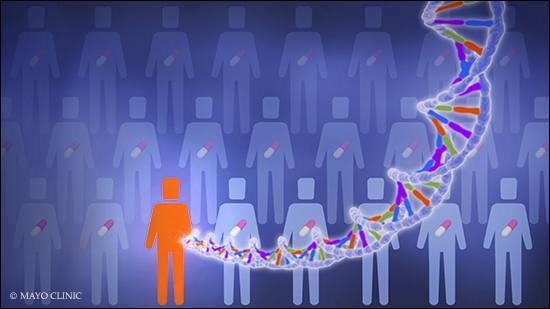
DEAR MAYO CLINIC: I’ve been hearing a lot about lab tests that can look at my genetics to see how I metabolize medications. How does this work and why is it important for me to know how my body metabolizes medicine?
ANSWER: Testing for how a person metabolizes medications is called pharmacogenomics testing, or PGx testing for short. This is a prime component of individualized medicine — selecting specific medications for each person based on personalized information.
Pharmacogenetic testing can help determine how a person metabolizes potentially hundreds of common medications, depending on how many genes are tested on a particular laboratory panel.
This specific testing can give pharmacists and health care providers better insight into adverse drug reactions and drug interactions as they review the medications patients take. These reviews help identify potential and current medication-related problems, especially in patients who take multiple prescriptions and over-the-counter medications, along with herbal and dietary supplements, including cannabis products.
Also, testing can guide therapy, optimizing medications to achieve the best outcomes. Your health care provider can use test results to guide medication selection and dosing. Pharmacogenetic labs also can help certain patients identify medications that they should never take to avoid serious, adverse drug reactions that could be fatal such as Stevens-Johnson syndrome, a rare but serious skin disorder.
Testing is relatively simple. A cheek swab is sent to a certified medical lab to be processed to determine how a patient metabolizes various medications. The processing takes anywhere from two to five weeks.
Mayo Clinic routinely processes pharmacogenetic panels. Results from direct-to-consumer labs cannot be used for clinical decision-making, as the results may not have been reviewed by a licensed physician, so it is important to know the type of lab taking and processing the sample.
At Mayo Clinic, a physician or another Mayo provider must order pharmacogenetic testing. Mayo Clinic requires a review appointment after the results are available to explain the meaning of the results.
Pharmacogenetic testing results become a permanent part of a patient's electronic health record for future use by providers to guide medication therapy long term. When a provider inputs a future prescription, notices of drug-gene interactions pop up on the computer screen in real-time to indicate interactions that may result in an adverse drug reaction or ineffectiveness of therapy. Then a health care provider can choose an alternative medication therapy that is more suitable.
Pharmacogenetic panel testing costs a few hundred dollars, but few insurance plans cover it. The good thing is the cost for a panel has decreased from thousands of dollars just a few years ago, and testing is permanent.
Another benefit of pharmacogenetic testing is that it can influence future development and use of medications. One example of how pharmacogenetic testing has changed medication therapy is codeine use in young children. For codeine to relieve pain, it must be converted to morphine by an enzyme known as CYP2D6. This enzyme is commonly tested in pharmacogenetics panels.
People can metabolize CYP2D6 enzyme medications at different speeds. It was determined that if children are ultrarapid metabolizers, they convert codeine to morphine too fast, resulting in morphine overdose that can be fatal. As a result, federal guidelines were changed for the use of codeine in children under 12 and in certain adolescents 12 to 18 who have breathing problems, or following tonsillectomy or adenoidectomies.
Soon after Mayo Clinic started providing pharmacogenetic testing, one patient discovered multiple relatives either had reactions to certain medications or medications did not work well for them. Ultimately, with testing, the patient learned the CYP2D6 gene was prevalent in the family. After the results confirmed suspicions, the family members now can decide in advance which medications are optimal for their needs.
One misconception is that pharmacogenetic testing about medication metabolism is the same as allergy testing. Although there is some overlap, the body systems involved overall differ. Allergy testing looks at the immune system's reaction to a foreign substance. It is important to speak to your health care provider about concerns if you believe you are allergic to a medication, but there still may be value in additional testing.
Pharmacogenetic testing has an exciting future in helping health care providers prescribe the best medications for each patient. Speak with your health care provider or local pharmacist to learn more and determine if it can help based on your health care needs. — Michael Schuh, Pharm.D., R.Ph., Pharmacy, Mayo Clinic, Jacksonville, Florida
****************************
Related Article
- Largest pharmacogenetic clinical trial in cardiology shows potential benefit in individualized approach to anti-platelet therapy published 8/25/20







